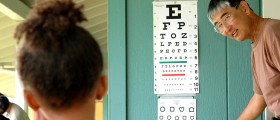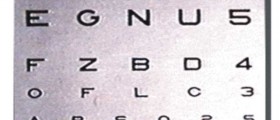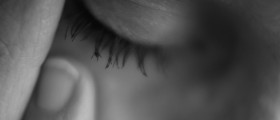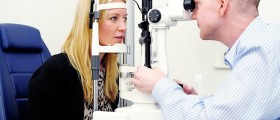
Our visual health is crucial for ourproductive life. We are usually unaware of the invaluable features ofour eyes. However, people who have impaired vision or suffer fromblindness know how debilitating this can be, making lifesignificantly harder. In order for our eyes to stay healthy and ourvision to stay sharp and clear, we need to make sure that we takegood care of them.
Yet, sometimes, despite our greatestefforts, vision problems reach the surface. In such cases, it is bestfor us to react timely and pay our doctor a visit, possibly beingdirected to the ophthalmologist afterwards.
Importance of Good Eye Health
There are many aspects of our vision weneed to preserve in order to see the world around us properly.Therefore, during an opthalmic examination for visual difficulties,all these possible problems are either ruled out or diagnosed andtreated.
Basically, people with healthy visionshould be capable of focusing on distant objects as well as objectsin close proximity, discerning them properly. Also, their peripheryand central vision need to be clear and without any impairments.Finally, no eye or brain diseases should be present, interfering withone's vision. If all these factors are ruled out, one's vision isconsidered to be excellent or satisfactory. However, many eyediseases remain covert until too late, not triggering any symptoms,making it hard for a person to detect them on time.
In order to prevent these adequately,people should undergo regular vision check-ups every once in a while,considering it a part of their routine primary care. Eye examinationssuch as the opthalmic examination are capable of detecting treatableblinding eye diseases, ocular manifestations of systemic disease,tumors and many other anomalies affecting either the eyes or thebrain.
The first part of a regular eyeexamination is external one, focusing on the inspection of theeyelids, as well as the surrounding tissues, depending on thesymptoms affecting the patient. This form of examination can detectconjunctivitis and some other disorders affecting the cornea and theiris.
Some other aspects of one's visualhealth involve his/her visual acuity, being the eye's capability tofine details and focus on certain images at a specific distances. Themeasures for these capabilities of one's eye vary from one country toanother, but these are most commonly measured by a special chartcalled the Snellen chart. However, the measurements for distance aretaken from the most commonly used in every country, be it meters,feet or some other.
The next part of the eye undergoingexamination is the pupil. The pupils should be of regular, expectedsize, having a regular shape, reacting to light as expected andcontaining all other necessary characteristics which are consideredto be healthy. This form of testing is usually carried out byexposing the pupils to flashlight which is swinging. During thisstage, the doctor observes the reactions and pays attention to them.If the pupils react differently to stimuli or show any unwantedbehavior, depending on the symptoms, the doctor performs other testsand, eventually, diagnoses the condition.
Whenever a person undergoes testing forvisual difficulties, he/she undergoes ocular motility as well,especially when he/she complains about double vision or some otherproblems of this type. Here, the doctor performs many tests throughwhich he/she may ask the patient to follow the finger with his sight or trace specific movement patterns. If the patient shows problemsduring the testing, depending on the causes behind them, theirconditions are diagnosed and adequate treatment approaches are set tomotion.
How To Prepare for Ophthalmic Testing?
You do not need to prepare for thisform of testing. Nevertheless, do not forget to bring your glasses orcontacts with you once you go to the doctor's since the testing needsyou to wear them. Also, report the medications you are taking to yourdoctor before the testing takes place. Some drugs interfere with yourvision and, possibly, the results of your ophthalmic testing. So,regardless whether you are taking certain over-the-counter orprescribed medications, let your doctor know about this.
Also, if you desire to prepare yourselfbetter, ask you doctor about the whole procedure you are about toundergo, knowing what to expect and making sure you give your best tofollow the instructions and perform as well as possible. Keep in mindthat you will have to undergo several tests. Thus, knowing someimportant facts about these can prove to be a valuable thing to optfor.
Ultimately, report reading problems,any existing vision problems or any other difficulties you experienceduring the testing since all these can influence your results and,potentially your diagnosis.
To sum up, ophthalmic examination forvisual difficulties is recommended to be done on a regular basis,even when no vision problems affect you. It is a great preventivetool and you are advised to take advantage of it and avoid sufferingfrom any eye diseases or other problems which can decrease or removeyour sense of sight.

















Your thoughts on this
Loading...